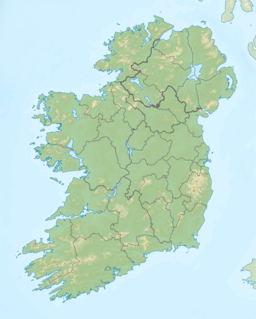Dunglow Lough
Appearance
| Dunglow Lough | |
|---|---|
| Loch an Chlocháin Léith (Irish) | |
 | |
| Location | County Donegal |
| Coordinates | 54°57′16″N 8°20′35″W / 54.95444°N 8.34306°W |
| Primary inflows | Lough Craghy |
| Primary outflows | Dungloe River |
| Catchment area | 37.67 km2 (14.5 sq mi) |
| Basin countries | Ireland |
| Max. length | 1.4 km (1 mi) |
| Max. width | 0.7 km (0.4 mi) |
| Surface area | 0.61 km2 (0.24 sq mi) |
| Average depth | 1.3 m (4 ft 3 in) |
| Max. depth | 7.5 m (25 ft) |
| Surface elevation | 13 m (43 ft) |
| Islands | Flat Island, Fern Island, Black Island, Brush Island, Wren Island |
| References | [1][2][3] |
Dunglow Lough (Irish: Loch an Chlocháin Léith),[4] also known as Dungloe Lough, is a freshwater lake in the northwest of Ireland. It is located in north County Donegal in the Rosses fishery.
Geography
[edit]Dunglow Lough is 1 kilometre (0.6 mi) east of Dungloe.[3] It measures about 1.5 km (0.9 mi) long and 1 km (0.6 mi) wide.[2] The lake has five named islands.[3]
Hydrology
[edit]Dunglow Lough is fed on its eastern side by neighbouring Lough Craghy. The lake drains westwards into the Dungloe River.[2]
Natural history
[edit]Fish species in Dunglow Lough include brown trout, salmon and the critically endangered European eel.[3]
See also
[edit]References
[edit]- ^ Free, Gary; Little, Ruth; Tierney, Deirdre; Donnelly, Karol & Caroni, Rossana (2006). A Reference Based Typology and Ecological Assessment System for Irish Lakes (PDF) (Report). Environmental Protection Agency (Ireland). p. 11. Retrieved 11 October 2022.
- ^ a b c "Dunglow Lough" (Map). Google Maps. Retrieved 4 February 2016.
- ^ a b c d "Water Framework Directive Fish Stock Survey of Dunglow Lough" (PDF). Inland Fisheries Ireland. August 2012. Retrieved 4 February 2016.
- ^ "Loch an Chlocháin Léith/Dunglow Lough". Placenames Database of Ireland. Government of Ireland - Department of Arts, Heritage and the Gaeltacht and Dublin City University. Retrieved 4 February 2016.

